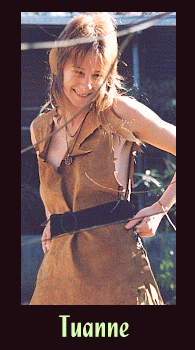 |
|||
|
|
|||
|
Some terms: KOORI: Originally a generic term used by the tribes around the central cast of New South Wales to identify themselves. Now a preferred an accepted term for Australia’s Aboriginals in general. GUBBA: A Koori term for white people, with varying degrees of invective depending on context. The actual meaning is as yet unknown to me - the closest I can find in books on Koori languages is “GABO” which means ‘we don’t know”!
If you come across a place which you feel is special, sacred, powerful or “inhabited” in some way, the first thing to do is stop and have a think about whether you should stay. If you are a male and the place feels strongly female (or vice versa), your contact wit it may be uncomfortable, if not detrimental, to you both . It may have been a Koori women’s (or men’s) place or sacred site, in which case it will not give of its energies freely or positively to an intruder of the opposite sex. The Kooris (and one or two of us “Gubbas”!) believe that many spirit-beings reside in the bush - some benevolent, some malevolent - and that contact with these parts of the bush must be approached respectfully, if at all, as it is you who are intruding into their home. Conception (of the spirit of a child, not necessarily its physical body), they believe, takes place when a fertile female goes to a particular place and “picks up” the residing spirit who is there, waiting to return to physical form. So here you are - in a place that feels strong or special in some way, and you want to show your respect and sincerity in your presence. The simplest way to do this is to take some soil from the place or its surrounds (preferably before you step right into the area that feels the strongest) and rub the soil across your forehead, on both cheeks and anywhere on your body that feels appropriate. If you like, say a few words, kiss the Earth or just sit and be silent for a while. If you feel good about the place, comfortable and accepted, and wish to return, ask for a sign. This will soon tell you if you really are welcome there, because if you’re not you’ll most probably get the proverbial “kick in the butt” in some form or another. But it depends on how open you are. If you are insensitive or disrespectful in some way, you may not even get a sign.
Gubbas have used and abused this land and its people since their arrival two hundred years ago, and it’s going to take a lot of effort and patience to regain trust from both the land and its people. A little word: if a place feels very powerful, strong or you suspect or know that it was an Aboriginal sacred site, don’t be afraid to take along a little protection, be it a talisman or a visualisation. Intruders may not be welcome and the sign you get may be more than you asked for. Ideally,though this is often very difficult, you should try to find out from the local people - particularly Koori - if there are any Koori stories or legends (not to mention, associations with past massacres) about the area you are exploring. A lot can also be learned from any Koori who might like to go with you. ”Long ago, back in the Dreamtime …” A common beginning to many Koori stories, the Dreamtime is happily placed in the past as a time when the plants, animals, birds, humans and the geography of the land were formed. But when one delves deeper into Koori spirituality, it seems that the Dreamtime is ever-present, a world apart, yet part of the physical plane (a very similar concept - or so I believe - to that of the Faerie Realms. It is an important part of day-to-day life in many ways, from teaching children to making major decisions about the tribe’s movements and activities. Before any decisions are made, the Tribal Elders meditate, go into trance, read the fires, and contact or are contacted by the “Wanjinas”. These seem to be messengers from the Dreamtime who move between the worlds and advise the Elders where to hunt and where not to, where to find food and water, and where to burn off (a necessary setting of fires to clear low-lying scrub which could, left to itself, ignite and cause a major bushfire, which would be uncontrolled and, therefore, more dangerous). They also give visions into the future and the past. The Dreamtime is also where one goes after death and before returning to the land in animal or human form. So why this determination to keep the Dreamtime in the past? Possibly the Kooris are playing upon the white people’s ignorance to prevent too much prying into the most valuable aspects of their culture. The myths of creation in Australia should not be ignored, but looked into more deeply if a connection to and understanding of this land is sought. |
|||
|
WebDesign: Rhea - Page last updated February 5 , 2001 Copyright Shadowplay 2000, 2001. All Rights Reserved. |
|||

